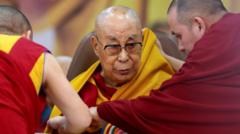As the Dalai Lama celebrates his 90th birthday this month, attention shifts towards the future of Tibetan Buddhism and the broader Tibetan community in exile. The revered spiritual leader, who led thousands to safety from Chinese persecution nearly seventy years ago, is gearing up to reveal his plans for succession—a move aimed at countering the Chinese government's attempts to assert control over Tibetan Buddhism.
Recent hints from the Dalai Lama suggest a possible deviation from long-standing succession traditions. In a bid to mitigate any power vacuum that Beijing could exploit, he appears to be crafting a unique strategy for selecting his successor. This evolution highlights the ongoing tension between the Tibetan spiritual leadership and the Chinese government, which has historically sought to influence the selection of religious leaders in Tibet.
To understand the significance of this potential succession shift, it is crucial to grasp who the Dalai Lama truly is. Born Tenzin Gyatso in 1935 into a farming family in what is now Qinghai Province of China, he was recognized at a tender age as the reincarnation of his predecessor, the 13th Dalai Lama. His early recognition led him to rigorous monastic training and deep immersion in Buddhist philosophy.
At the age of 16, upon the onset of crises in Tibet following the invasion by Chinese troops in 1950, the Dalai Lama stepped into a political role as Tibet's leader. He guided his people through armed conflicts and, following the 1959 Tibetan uprising, he was forced into exile in India, where he continues to reside with many followers.
With the Dalai Lama's heirs still a focal point of geopolitical concern, the impending announcement of a new succession plan represents not only a pivotal moment for Tibetan Buddhism but also a decisive stand against foreign interference. As we await further details, the world watches to see how this unique succession process will unfold, possibly reshaping the landscape of Tibetan spiritual leadership for generations to come.



















